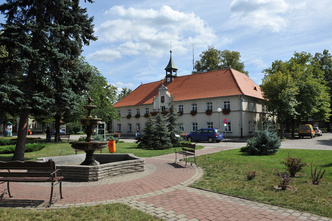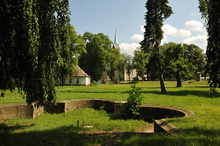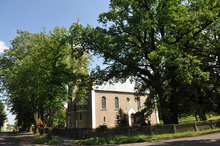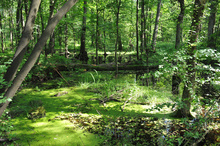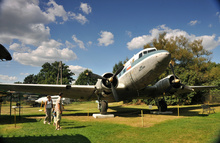Czerwieńsk Commune
Czerwieńsk Commune can be visited on foot, by bicycle or by kayak.
There are walking, cycling and water trails available. The Black Trail leads from Ołobok to Grabowiec, the Yellow Trail – from Nowa Sól to Krosno Odrzańskie and the Blue Trail – from the PKP railway station in Nietkowice to Boryszyn. In order to fully appreciate the natural beauty of the places to visit, the hiker must have good walking boots, strong feet and … a good mood. On both sides of the Odra river there also run, how else, the cycling Blue Trails of the Odra River. One takes you from Brody to Radnica, the other one from Wójcików to Ciemnice. Kayaking fans can cover 23 kms down the Odra river or 20 kms down another river, bearing a cool name – the Cold Water.
The oldest monument of architecture in the commune is St. Mary’s Parish Church of Assumption in Leśniów Wielki, most probably built in the 14th c. ( first mention comes from 1399 ) – a one-nave structure with a rectangular presbytery and a steeple on the west side. The structure has undergone frequent reconstructions, leaving it prominently Gothic and Baroque in character. The church is richly furnished, the following elements deserving special mention: the late Gothic triptych by the Master of the Altar from Gościszowice, dating from 1516, the carved Renaissance tombstones from the 16th and 17th c., and the late-Baroque altar and pulpit. The bell, cast in the 17th c., was recovered in 2004; in 1941 it was taken by the German army for melting, but, by a fortunate coincidence, was found in an Evangelical parish deep in Germany. The late-Baroque grave chapel situated next to the church was erected in 1714. It is a masonry structure, built on the plan of a square with a barrel vault crypt.
Other historic places of interest in Czerwieńsk Commune include: in Czerwieńsk – the 17th c. St. Wojciech’s Parish Church, placed centrally in the town; in Laski – the Classicistic manor from the beginning of the 19th c.; in Sycowice – an 18th c. church; in Będów, Nietków and Nietkowice – 19th c. churches.
270 ha (not much indeed) lying in the north-western part of the commune is situated within the Gryżyński Landscape Park. The whole Park covers an area of 2,755 ha. It is worth going for a walk along the grand oak alleys. The beautiful, impressive 200-year-old oaks teach us humility in the busy world. The diversified geology of the area is a great asset of the Park. The steep inclination of the trough’s slopes, numerous post-glacial lakes, ponds, valley slope springs and bogs leave a lasting impression. In the Gryżynka River one can see real stream-living trout. During the hike the lucky ones may also notice beavers working in their lodges, a white-tailed eagle circling over the Park or a grey heron flying over. Indeed, it is a place that makes you feel sorry to leave.
In Nietków there is a historic landscape park laid out in mid-18th c. by the palace complex. The 2.5-hectare park accommodates interesting specimens of trees and shrubs, including an 18th-c. monumental acacia, a platanus – a monument of nature, and a very rare specimen of the cork oak. Near Nietków, there is also an arboretum. It was founded in late 19th c. by the owner of Czerwieńsk, Count Rothenburg. In character, it is a specimens collection of species and decorative varieties. The arboretum lies within the fluvial terrace of the Odra River. In order to preserve the complex, reconstruction of the dendrological inventory has been planned to repair the damage caused by the disastrous flooding that took place in July 1977. When the renovation and recultivation have been finished, the complex will be open to the public.
In the vicinity of the village of Bródki numerous remains of a well-preserved system of German bunkers can be seen. The are situated along the Ołobok canal and are part of the southern fragment of the Międzyrzecz Fortified Region. MRU [MFR] was built by Germans between the two World Wars. In nearby Brody (it is already Sulechów Commune) another attraction awaits tourists - a ferry crossing across the Odra River to Czerwieńsk.
Images
scroll topThe arboretum in Nietków
The arboretum in Nietków stretches from the north-western part of the village towards the Odra River and covers a few hectares. It was founded by the former owners of Nietków, the Rothenburgs, in the early-19th c. The arboretum boasts a broad collection of rare species of shrubs and trees.
« Previous 1 2 3 Next »
The Lubuskie Military Museum - Drzonów
The Lubuskie Military Museum in Zielona Góra, located in Drzonów (Świdnica Commune) is the second largest and second in order of importance collection of militaria in Poland.

